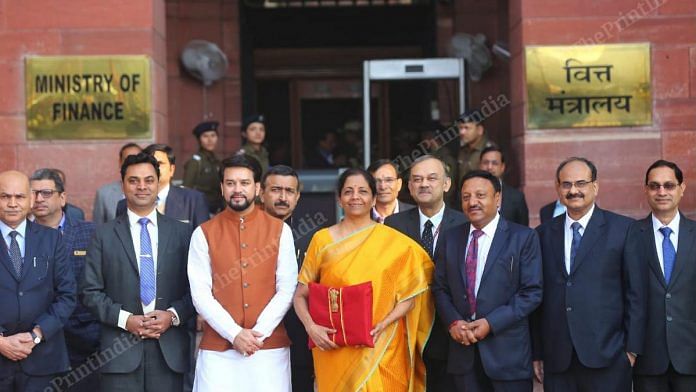New Delhi: Non-resident Indians not paying taxes in any foreign country will now be taxed in India, the Union Budget for 2020-21 has proposed.
At present, if an Indian or a person of Indian origin managed his stay in India such that he remained a non-resident in perpetuity, he was not liable to pay tax on his global income in India.
The Union Budget 2020 has now proposed to introduce a deeming provision that every Indian citizen who is not liable to tax in any other country, by virtue of his domicile or residence, shall be deemed as a resident of India. Consequently, his global income would be taxable in India.
Tightening the residency provisions, the Budget also proposed to reduce the period of stay in India to 120 days from 182 days earlier for persons of Indian origin (PIOs) to be categorised as non-resident Indians (NRIs).
“…In many cases we have found that some people are residents of no country in the world, they may be staying a certain number of days in different parts of the world. So… any Indian citizen – if he is not a resident of any country in the world – would be deemed to be resident in India, and then his worldwide income will be taxed,” Revenue Secretary Ajay Bhushan Pandey said.
Amending Section 6 of the I-T Act, the Budget proposed that “Notwithstanding anything contained in clause (1), an individual, being a citizen of India, shall be deemed to be resident in India in any previous year, if he is not liable to tax in any other country or territory by reason of his domicile or residence or any other criteria of similar nature”.
Reworking the definition of NRIs, the Budget document said that the I-T Act provides that an Indian citizen or a person of Indian origin shall be Indian resident if he is in India for 182 days in that year.
“This provision provides relaxation to an Indian citizen or a person of Indian origin allowing them to visit India for a longer duration without becoming resident of India. Instances have come to notice where the period of 182 days specified in respect of an Indian citizen or person of Indian origin visiting India during the year is being misused.
“Individuals, who are actually carrying out substantial economic activities from India, manage their period of stay in India, so as to remain a non-resident in perpetuity and not be required to declare their global income in India,” said the memorandum to the Budget.
Pandey said changes have been brought about in the Income Tax Act, which states that if an Indian citizen stays more than 180 days out of the country, he becomes a non-resident.
So we have made some changes there. Now, in order for him to become a non-resident he has to stay out of the country for 240 days, Pandey said.
The Budget also proposes to rework the definition of “not ordinarily resident” in India, if the individual has been a non-resident in India in 7 out of 10 previous years preceding that year. Earlier for an individual to be considered “not ordinarily resident”, he/she had to be a non-resident in India in 9 out of 10 years.
Nangia Andersen Chairman Rakesh Nangia said, “Residency provisions for the purpose of taxation has been tightened, specifically for stateless persons, who are not liable to tax in any country or jurisdiction. This could impact non-resident Indians staying in countries such as UAE which does not impose income tax on individuals under local tax laws.
Transaction Square Founder Girish Vanvari said, “These changes in definition would deter people from coming to India and some can even think of giving up Indian citizenship”.
Gopal Bohra of NA Shah Associates said at present, it is entirely possible for high net worth individuals to arrange his affairs in such a fashion that he would not be liable to tax in any other country and also not in India.
The new provision “will adversely impact High Networth Individuals using the domicile mechanism to evade tax globally,” he said.
Also read: Winners and Losers: Who got what in Nirmala Sitharaman’s Budget 2020




Countries like USA does not require any one to even file a tax form if their income is below $12,000. This is over and above their social security income, Indian govt. can not tax them because it agreed these are not its income to tax.
Yes this situation of 120 days in the country will impact a lot of rich NRIs and they might choose to give away the Indian Passports